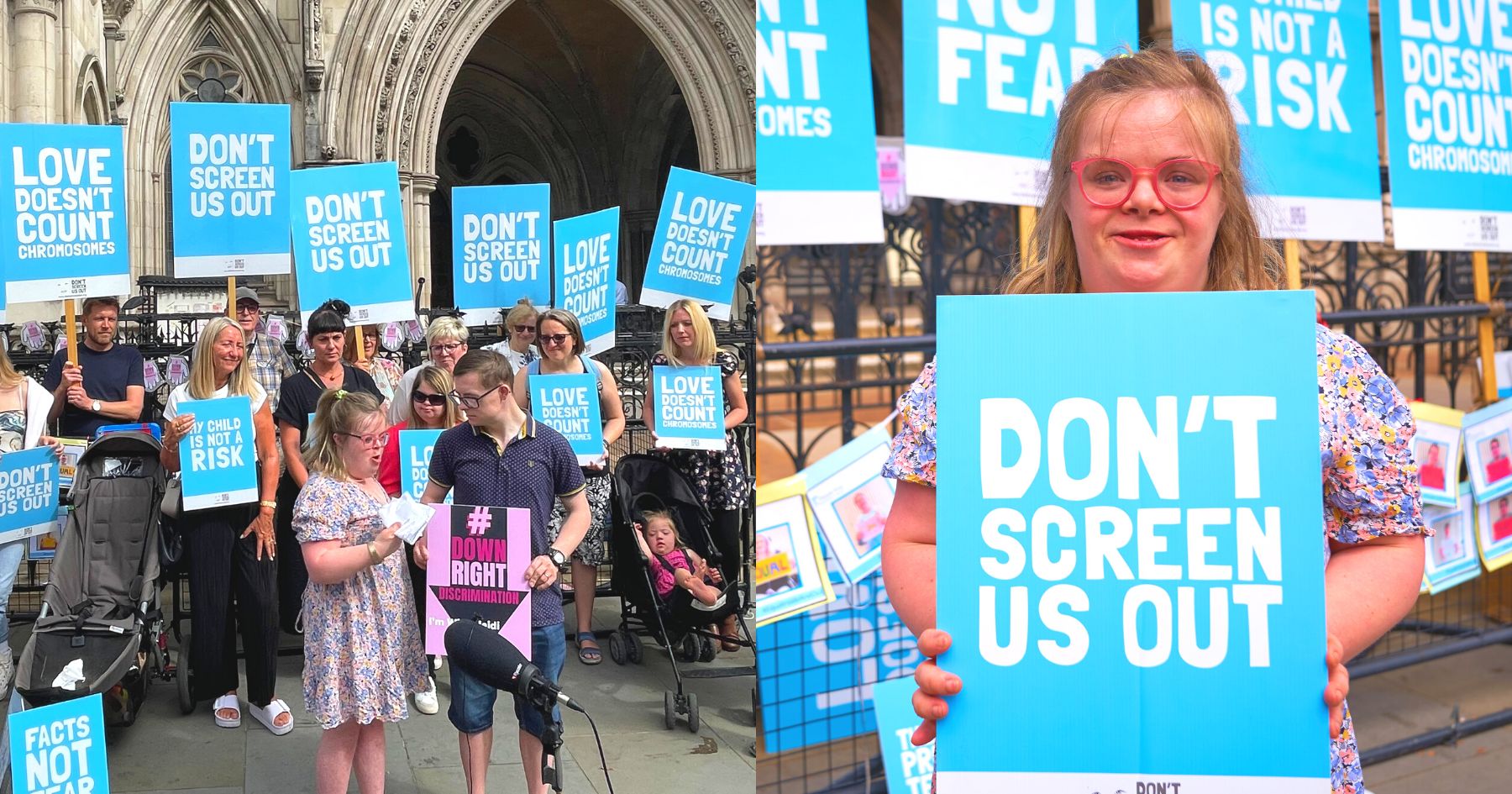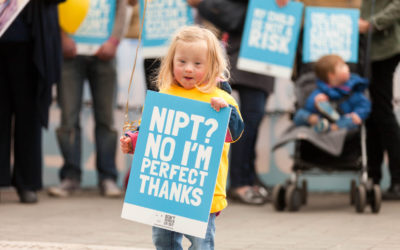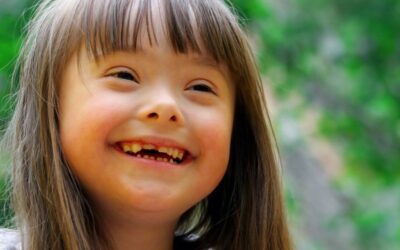Photos and video from rally available to be freely used by media:
https://www.flickr.com/photos/dontscreenusout/albums/72177720300518498 and https://www.youtube.com/watch?v=jsJZC4OFvT4
PRESS RELEASE – FOR IMMEDIATE RELEASE
Down’s syndrome campaigners rally outside Court of Appeal as case over discriminatory abortion law heard
A large group of people with Down’s syndrome and their families rallied outside the Court of Appeal today in support of Heidi Crowter and Máire Lea-Wilson as the hearing of their court case against against the UK Government over the current discriminatory abortion law that allows abortion up to birth for Down’s syndrome was heard.
Heidi Crowter, a 27-year-old woman from Coventry who has Down’s syndrome, together with Máire Lea-Wilson from Brentford, West London, whose three-year-old son Aidan has Down’s syndrome, are challenging the UK Government over a disability clause in the current abortion law. Máire Lea-Wilson was placed under pressure to have an abortion when a 34-week scan revealed her son had Down’s syndrome.
Heidi addressed a large rally of supporters who had travelled from around the country.
Further notes on the case and background on the issue are provided below the press release.
Speaking outside the High Court Heidi Crowter said:
“When I tell people about the court case they say that it’s not fair. I am hopeful that the judges will see that it is not fair.
If the law said that all girl babies could be aborted up to birth everyone would say that is discrimination. So why does the law say that it is ok to terminate disabled babies right up to birth?
In 2022 we live in a society where disabled people are valued equally after birth but not in the womb. I hope that the judges will agree with me that this law is discrimination and needs to be changed.”
Speaking outside the High Court, Heidi Crowter’s husband James Carter, who has Down’s syndrome said:
“I would like to say how important the case is for all people with Down’s syndrome, we are so much more than a diagnosis and should be treated equally in law, we are here to tell the world that.
I am so proud of Heidi and Aidan for taking on this case, it’s been so hard at times, but they, along with Aidans mum Máire, have been so brave, in fact the bravest people I know.”
Ms Lea-Wilson, 33, an accountant from Brentford, West London and mother to Aidan who has Down’s syndrome said:
“I am thrilled that the case is being heard by the Court of Appeal, and I hope that this will be the time that we all stand up for equality.
I have two sons that I love and value equally, but the law does not value them equally. This is wrong and so we want to try and change that.
My motivation for taking this joint legal action with Heidi has always been simple. As a mother, I will do all that I can to ensure the fair and equitable treatment of my son, Aidan. Throughout the last two years since joining the case, it has become ever increasingly clear to me that Section 1(1)d of the Abortion Act, which differentiates the time limit for abortion, sets the tone for discrimination against people with Down’s syndrome which starts before they are born and continues throughout their life with devastating consequences.
What does this law say to people like my son? That his life isn’t as valuable as his older brother’s? How will that make him feel? How will I explain it to him? This case is not about the rights or wrongs of abortion, it has always been about removing a specific instance of inequality of the law, whereby for a child without a disability the legal limit for abortion is 24 weeks, but you can have an abortion right up to full term with a child that does have a disability. We proclaim that we live in a society which values those with disabilities, that everyone deserves a fair and equal chance at life, regardless of their ability status. This law undermines that narrative, does it really have a place in 2022?
Aidan is 3 now, and he amazes me. He makes us laugh every single day. He has shown us so much about joy, tenacity and the inextricable worth of life. I wouldn’t change a single thing about him.”
Lynn Murray, spokesperson for Don’t Screen Us Out and mother of Rachel who has Down’s syndrome, said:
“By stating that disability is grounds for termination, section 1(1)(d) of the Abortion Act, promotes inequality.
The provision in the Abortion Act harks back to a time when we thought it was better for people with disabilities not to be part of our society. We’re a far more progressive society now, we realise that diversity is healthy, and all of our laws should reflect that.”
ENDS
- For more information on the Don’t Screen Us Out campaign, see our website www.dontscreenusout.org or email info@dontscreenusout.org
- For interviews, contact Don’t Screen Us Out spokesperson Lynn Murray on 0784 0966 736 or email info@dontscreenusout.org
- Photos which can be used by the media are available here: https://www.flickr.com/photos/dontscreenusout/albums
- Heidi’s Facebook page:
Key details on case and issue:
- Heidi Crowter is a self-advocate who has campaigned for the last six years for equal treatment for those with Down’s syndrome in all areas of life. Máire Lea-Wilson was placed under pressure to have an abortion when a 34-week scan revealed her son had Down’s syndrome.
- Heidi and her team have already crowdfunded over £144,000 for the case.
- Currently in England, Wales and Scotland, there is a general 24-week time limit for abortion, but if the baby has a disability, including Down’s syndrome, cleft lip and club foot, abortion is legal right up to birth.
- Statistics from the Department of Health and Social Care show that there were 3,370 disability-selective abortions in 2021, a 9% increase from 2020. 859 of the babies had been confirmed to have Down’s syndrome, an increase of 23.95% from 2020. The statistics also showed a 71% increase in late-term abortions at 24 weeks gestation or over where the baby had Down’s syndrome, increasing from 14 in 2020 to 24 in 2021.
- The actual figures are likely to be much higher – a 2013 review showed 886 fetuses were aborted for Down’s syndrome in England and Wales in 2010 but only 482 were reported in Department of Health records. The underreporting was confirmed by a 2014 Department of Health review.
- The UN Committee on the Rights of Persons with Disabilities has consistently criticised countries that provide for abortion on the basis of disability.
- The Committee on the Rights of Persons with Disabilities’ concluding observations on the initial report of the United Kingdom of Great Britain and Northern Ireland made a key recommendation that the UK change its abortion law so that it does not single out babies with disabilities. The Government has decided to ignore this recommendation.
- The Disability Rights Commission (now the Equality and Human Rights Commission) has said that this aspect of the Abortion Act “is offensive to many people; it reinforces negative stereotypes of disability…[and] is incompatible with valuing disability and non-disability equally”.
- The 2013 Parliamentary Inquiry into Abortion for Disability found the vast majority of those who gave evidence believed allowing abortion up to birth on the grounds of disability is discriminatory, contrary to the spirit of the Equality Act 2010 and that it affects wider public attitudes towards discrimination. The Inquiry recommended Parliament reviews the question of allowing abortion on the grounds of disability and should consider repealing section 1(1)(d) of the Abortion Act which allows for it.
- Disabled peer Lord Shinkwin proposed a Bill in the House of Lords that would have repealed section 1(1)(d) of the Abortion Act – the Bill was undefeated but unfortunately ran out of time. The Bill was supported by Disability Rights UK.
- Polling has shown that the majority of people in England, Wales and Scotland feel that disability should not be a grounds for abortion at all, with only one in three people thinking it is acceptable to ban abortion for gender or race but allow it for disability.
- Previous news coverage featuring Heidi Crowter:
- https://www.telegraph.co.uk/news/2020/10/18/woman-downs-syndrome-says-better-dead-eyes-law-ahead-legal-challenge/
- Sky News – https://www.youtube.com/watch?v=Qz0pU7TKqb0
- https://www.dailymail.co.uk/news/article-8351603/Woman-Downs-Syndrome-launches-legal-bid-end-abortion-discrimination.html
- Victoria Derbyshire Show – https://www.youtube.com/watch?v=eeNuWj3xhbM
- Channel 5 News – https://www.youtube.com/watch?v=eeNuWj3xhbM
- https://www.theguardian.com/society/2018/dec/03/my-life-is-just-as-important-as-everybody-elses-meet-the-disability-leaders
- https://www.bbc.co.uk/news/av/45790521/the-23-year-old-busting-myths-about-down-s-syndrome
- https://www.itv.com/news/central/2019-03-21/he-makes-me-the-happiest-girl-in-the-world-twenty-three-year-old-with-downs-on-her-love-life-and-work-wouldntchangeathing-downs-syndrome-world-downs-syndrome-day/
- https://www.huffingtonpost.co.uk/entry/having-downs-syndrome-doesnt-make-me-less-of-a-person_uk
- https://www.dailymail.co.uk/video/news/video-1318649/Heidi-Crowter-s-powerful-s-Syndrome-message-Jeremy-Hunt.html
- Down’s syndrome abortion figures are expected to increase as NIPT is rolled out across hospitals on the NHS. The number of babies born with Down’s syndrome has dropped by 30% in NHS hospitals that have introduced the new test.



